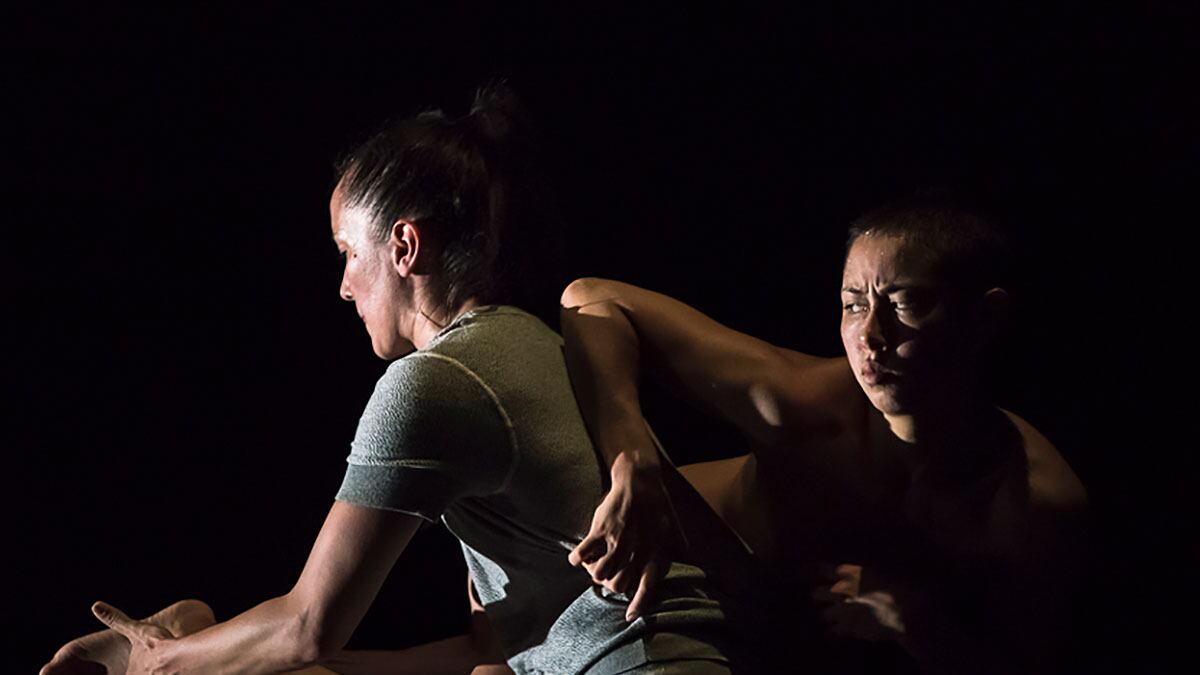Two performers—one nude (Lilian Steiner) and one clothed (Melanie Lane)—take their places on a stage. Then something strange happens. After 20 minutes of dancing, they bisect the floor with tape and continue with the show, each confined to one half of the stage, for another 10 minutes. The available room continues to shrink, until both space and time have dwindled to nothing and the bodies of the two dancers are pressed ever closer together.
That is the premise of Split, a new work from legendary Australian choreographer Lucy Guerin, presented by White Bird Dance. "I felt a real need to reconnect with just the pure elements of choreography—time, space and movement," she says. "I wanted to focus on those very sensual components of dance.
Split arrives in Portland trailed by myriad interpretations. Is it a political statement? Is it about romance or parenthood? Guerin is loath to reduce her work to a single idea. But she did speak to WW about her choreographic process, the meaning of nudity in Split and the weirdest reactions audiences have had.
WW: What revelations did you have when you were first exposed to postmodern, contemporary dance?
Lucy Guerin: I felt a different way of moving than I had before that wasn't as muscular or as much about the shape of what you see from the outside. It was more about experiencing the movement, and that's something that's stayed with me.
Split is very much a dancer's piece. It's really a work that the audience is drawn into. I think that's the reason I chose these two dancers, Melanie Lane and Lilian Steiner. They're very self-contained, which I think makes you lean forward on your feet and want to understand them, as opposed to sitting back in the dark and merely being entertained.
Tell me about the genesis of Split.
I thought of the idea that the space keeps reducing and reducing until the dancers have only got a very tiny amount of space, and basically the space runs out and the time runs out. One of the things that came later in the process was the idea of having one dancer nude and one dancer clothed, which came from wanting them to exist in very different worlds. And when we tried that in-studio, I could see that Lilian has such a confident way of moving that it presented the female body in a very normal sort of working way.
Quite often, when you see performers nude—especially women—it's sexualized, or it's about shock or about being vulnerable. I found Lilian's way of presenting the female body empowering and really interesting from the perspective of being able to see what a dancer's body actually does when they're moving.
How do viewers interpret the performance?
People often see it in a global or quite political way, and think that it's about the loss of resources—less land, less water, population explosion and less room. And then there's people who say, "It's like the inner struggle that we all have with ourselves." There's been some strange interpretations, like that it's about colonization or eating disorders.
There's a part where the dancers are right on top of each other.
There's a lot of jostling of power. There is this sense of a struggle for supremacy. It's a desire to almost consume the other person or annihilate them.
What does contemporary dance mean to you?
I am searching. I do think about trying to find something that's not familiar to me, that I haven't seen before, perhaps that I don't even quite understand. But I wouldn't say that my work is new because it relies on my whole history, and I'm drawing from so many different sources, both from my dancing life and my choreographic life. I'm being influenced by many other people and by my earlier self.
SEE IT: Split plays at Portland State University's Lincoln Hall, 1620 SW Park Ave., whitebird.org. 8 pm Thursday-Saturday, Oct. 18-20. $25-$34.
